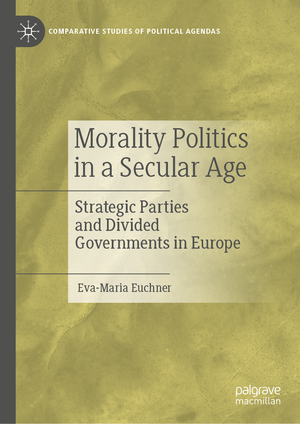Morality Politics in a Secular Age: Strategic Parties and Divided Governments in Europe: Comparative Studies of Political Agendas
Autor Eva-Maria Euchneren Limba Engleză Hardback – 13 mai 2019
"Euchner’s carefully researched and cogently argued study of morality politics in Europe adds an outstanding piece of research to the ever growing literature on religion and politics. Its combination of quantitative and qualitative comparative analysis involving a novel data set and cross-policy perspectives demonstrates persuasively the role of religion as a resource for political action even in secularized societies."
—Michael Minkenberg, Viadrina European University, Germany
—Raymond Tatalovich, Loyola University Chicago, USA
This book introduces a new theoretical framework from which to understand religion and morality politics in Europe. This framework provides a first—and rather provocative—answer to the general debate on how religion influences policy-making processes. Specifically, the book argues that religion is more a strategic resource for political parties than a fundamental normative doctrine shaping political parties’ policy-making behavior in a systematic and coherent way. The framework proposes a mechanism (i.e. wedge issue competition) that can be used to identify and explain the conditions under which issues related to religious values rise and fall in parliaments of the religious world in Europe and what consequences we may expect in terms of policy reforms.
Preț: 503.70 lei
Preț vechi: 592.59 lei
-15% Nou
Puncte Express: 756
Preț estimativ în valută:
96.38€ • 100.89$ • 80.22£
96.38€ • 100.89$ • 80.22£
Carte tipărită la comandă
Livrare economică 31 martie-14 aprilie
Preluare comenzi: 021 569.72.76
Specificații
ISBN-13: 9783030105365
ISBN-10: 3030105369
Pagini: 228
Ilustrații: XXIV, 301 p. 43 illus.
Dimensiuni: 148 x 210 mm
Greutate: 0.54 kg
Ediția:1st ed. 2019
Editura: Springer International Publishing
Colecția Palgrave Macmillan
Seria Comparative Studies of Political Agendas
Locul publicării:Cham, Switzerland
ISBN-10: 3030105369
Pagini: 228
Ilustrații: XXIV, 301 p. 43 illus.
Dimensiuni: 148 x 210 mm
Greutate: 0.54 kg
Ediția:1st ed. 2019
Editura: Springer International Publishing
Colecția Palgrave Macmillan
Seria Comparative Studies of Political Agendas
Locul publicării:Cham, Switzerland
Cuprins
1 Introduction.- 2 Morality policy as a party issue in a secular age.- 3 A new framework of attention on and change of morality issues in parliaments of the religious world.- 4 Comparing attention and change in morality issues.- 5 The rise and fall of morality policies in Austria, Germany, Spain and the Netherlands.- 6 Mechanisms of wedge issue competition.- 7 Explaining patterns of morality policy change in Austria, Germany, Spain and the Netherlands.- 8 The indirect effect of parliamentary attention on morality policy change through the stimulation of venue shifts and changing policy images.- 9 Morality politics in a secular age.
Notă biografică
Eva-Maria Euchner is a postdoctoral researcher at the Ludwig-Maximilians-University Munich, Germany. She studied Politics and Public Administration at the University of Konstanz. Her research trajectory focuses on morality politics, religion and legislative behaviour. She has published articles in the Journal of European Public Policy, Politics and Religion and Parliamentary Affairs.
Textul de pe ultima copertă
"Euchner’s carefully researched and cogently argued study of morality politics in Europe adds an outstanding piece of research to the ever growing literature on religion and politics. Its combination of quantitative and qualitative comparative analysis involving a novel data set and cross-policy perspectives demonstrates persuasively the role of religion as a resource for political action even in secularized societies."
—Michael Minkenberg, Viadrina European University, Germany
“Building upon the dichotomy between the “secular” and “religious” worlds of European morality politics, Dr. Euchner plumbs the empirical depths of four nations to unearth a compelling theoretical explanation for when value-laden conflicts surface in parliaments with a strong secular-religious party cleavage. This singularly important volume belongs in the institutional libraries and bibliographic collections of every serious student of public policy analysis, especially those of us who focus on morality policy.”
—Raymond Tatalovich, Loyola University Chicago, USA
Caracteristici
Develops a new framework for understanding religion and morality politics in Europe Argues that a logic of wedge issue competition drives the politicization of morality policies in parliaments of the religious world Opts for a dynamic (time-variant) conception of the effect of parliamentary issue attention on morality policy change









